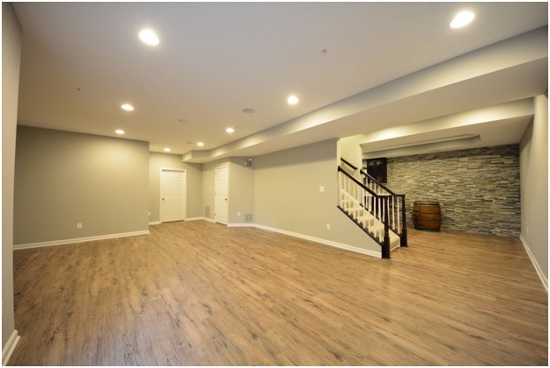There are many types of basement flooring options. Some are more durable than others. For a low-maintenance, warm feel, carpeting is the way to go. If you want more comfort and warmth, consider porcelain tile or a Terrazo style. These are relatively easy to maintain and are warm underfoot. You should also consider the type of subfloor if you choose to install a click product over a concrete floor.


Uses of carpet and Marmoleum in the Home
One type of flooring that works well in basements is carpet. While some rooms lend themselves to a soft, cozy feel, many homeowners find carpeting to be an excellent choice throughout the house. This type of flooring also helps to counteract coldness, which is why it’s an excellent choice for movie rooms, playrooms, and recreational spaces. While this type of flooring isn’t ideal for any home, it’s a popular choice for many people.
Another popular choice for flooring in basements is Marmoleum. This type of flooring is made of linseed oil, limestone, wood flour, and jute. It is eco-friendly and stainproof. It’s easy to maintain and can be bought in tiles and sheets in almost any color. You should also consider how much time you want to invest in your new floors by floor tiles. Most of these types of basement flooring options are inexpensive.
Features of Different flooring techniques
Another popular choice is laminate flooring. Available in a variety of sizes and colors, laminate is a great choice for homeowners looking for a stylish, affordable floor. It’s very easy to install, and comes with a wide selection of designs. Vinyl sheet flooring is a cheap alternative, costing about $1 to $2 per square foot. This material can be used for many different purposes, including floors in basements, and is extremely durable and easy to clean.
There are several other basement flooring options available. The first one is vinyl. It is a type of flooring that can be installed over a concrete slab. However, it is important to keep in mind that the surface of the basement must be smooth and flat to avoid bumps. A smooth surface is essential to prevent stains and scratching. The next option is vinyl tile. It can cost from $1 to $5 per square foot.
Options for flooring in the basement
If you are looking for a more durable flooring option for your basement, consider installing laminate flooring. It can be purchased at a discount and can cost up to $11 per square foot. It is also waterproof, so you should buy laminate flooring with a warranty. Ceramic tile is another good option for a basement. It comes in many different colors and can look like wood. If you want to make your basement a more comfortable place to spend time, you can use cork.
Cork flooring is another option for basement flooring. It is very durable and will last a long time. It is also good at absorbing sound, so you can enjoy listening to music while you are in your basement. A cork floor is very easy to install. If you need to replace a tile, it can be sanded down and refinished. The best thing about cork flooring is that it is eco-friendly and is a great option for a basement.
Carpet Tiles Uses as a basement
Carpet tiles are another option for basement flooring. It is waterproof and can hide any uneven subflooring. Most of these tiles are easy to install and don’t require any adhesive during installation. But they can be expensive to ship. If you decide to go with tiles, be sure to ask for recommendations from your contractor. The best thing to do is research different options and select the one that suits your needs. A little bit of research can go a long way in your basement renovation.
Conclusion
Whether you choose to go with carpeting or tile, there are many options to consider. Carpeting is the easiest option to maintain. Rubber is the most durable material available for basement flooring. A rug may look nice in a home with a warm theme, but it will get damp and rot over time. If you decide to go with carpeting, you can opt for hardwood, ceramic tiles, or even vinyl. Just make sure you know what your home needs and you’ll be fine.
















